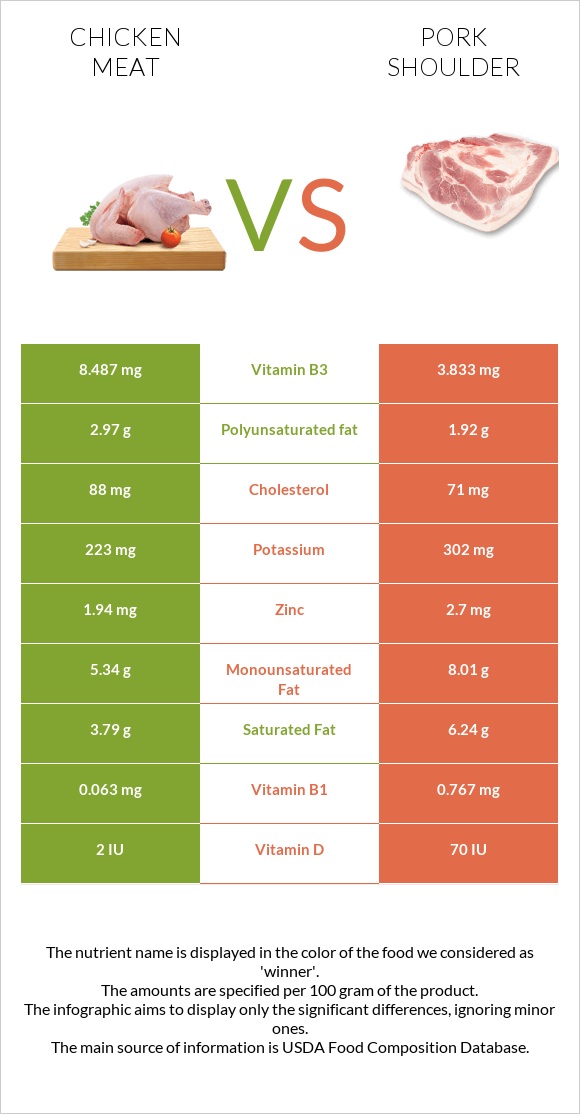Chicken meat vs. Pork shoulder — In-Depth Nutrition Comparison
Compare
How are chicken meat and pork shoulder different?
- Chicken meat is higher in vitamin B3 and vitamin B5; however, pork shoulder is richer in vitamin B1, vitamin B12, vitamin D, vitamin B2, and zinc.
- Daily need coverage for vitamin B1 for pork shoulder is 59% higher.
- Chicken meat contains 2 times more vitamin B3 than pork shoulder. While chicken meat contains 8.487mg of vitamin B3, pork shoulder contains only 3.833mg.
- Pork shoulder has less cholesterol.
Chicken, broilers or fryers, meat, and skin, cooked, roasted and Pork, fresh, shoulder, whole, separable lean, and fat, raw are the varieties used in this article.
Infographic

Infographic link
Mineral Comparison
Mineral comparison score is based on the number of minerals by which one or the other food is richer. The "coverage" charts below show how much of the daily needs can be covered by 300 grams of the food.
| Contains more MagnesiumMagnesium | +27.8% |
| Contains more IronIron | +20% |
| Contains more ManganeseManganese | +81.8% |
| Contains more PotassiumPotassium | +35.4% |
| Contains more CopperCopper | +27.3% |
| Contains more ZincZinc | +39.2% |
| Contains less SodiumSodium | -20.7% |
Vitamin Comparison
Vitamin comparison score is based on the number of vitamins by which one or the other food is richer. The "coverage" charts below show how much of the daily needs can be covered by 300 grams of the food.
| Contains more Vitamin AVitamin A | +2300% |
| Contains more Vitamin EVitamin E | +42.1% |
| Contains more Vitamin B3Vitamin B3 | +121.4% |
| Contains more Vitamin B5Vitamin B5 | +43.3% |
| Contains more Vitamin B6Vitamin B6 | +14.9% |
| Contains more Vitamin KVitamin K | +∞% |
| Contains more Vitamin CVitamin C | +∞% |
| Contains more Vitamin DVitamin D | +∞% |
| Contains more Vitamin B1Vitamin B1 | +1117.5% |
| Contains more Vitamin B2Vitamin B2 | +63.7% |
| Contains more Vitamin B12Vitamin B12 | +146.7% |
All nutrients comparison - raw data values
| Nutrient |  |
 |
DV% diff. |
| Vitamin B1 | 0.063mg | 0.767mg | 59% |
| Vitamin B3 | 8.487mg | 3.833mg | 29% |
| Protein | 27.3g | 17.18g | 20% |
| Vitamin B12 | 0.3µg | 0.74µg | 18% |
| Saturated fat | 3.79g | 6.24g | 11% |
| Vitamin D | 2 IU | 70 IU | 9% |
| Vitamin D | 0µg | 1.7µg | 9% |
| Vitamin B2 | 0.168mg | 0.275mg | 8% |
| Fats | 13.6g | 17.99g | 7% |
| Zinc | 1.94mg | 2.7mg | 7% |
| Monounsaturated fat | 5.34g | 8.01g | 7% |
| Polyunsaturated fat | 2.97g | 1.92g | 7% |
| Cholesterol | 88mg | 71mg | 6% |
| Vitamin B5 | 1.03mg | 0.719mg | 6% |
| Vitamin A | 48µg | 2µg | 5% |
| Vitamin B6 | 0.4mg | 0.348mg | 4% |
| Iron | 1.26mg | 1.05mg | 3% |
| Selenium | 23.9µg | 25.5µg | 3% |
| Potassium | 223mg | 302mg | 2% |
| Copper | 0.066mg | 0.084mg | 2% |
| Vitamin K | 2.4µg | 0µg | 2% |
| Vitamin C | 0mg | 0.7mg | 1% |
| Magnesium | 23mg | 18mg | 1% |
| Sodium | 82mg | 65mg | 1% |
| Vitamin E | 0.27mg | 0.19mg | 1% |
| Choline | 65.9mg | 60.6mg | 1% |
| Calories | 239kcal | 236kcal | 0% |
| Calcium | 15mg | 15mg | 0% |
| Phosphorus | 182mg | 182mg | 0% |
| Manganese | 0.02mg | 0.011mg | 0% |
| Folate | 5µg | 5µg | 0% |
| Tryptophan | 0.305mg | 0.208mg | 0% |
| Threonine | 1.128mg | 0.768mg | 0% |
| Isoleucine | 1.362mg | 0.781mg | 0% |
| Leucine | 1.986mg | 1.36mg | 0% |
| Lysine | 2.223mg | 1.531mg | 0% |
| Methionine | 0.726mg | 0.441mg | 0% |
| Phenylalanine | 1.061mg | 0.681mg | 0% |
| Valine | 1.325mg | 0.921mg | 0% |
| Histidine | 0.802mg | 0.656mg | 0% |
| Omega-3 - EPA | 0.01g | 0g | N/A |
| Omega-3 - DHA | 0.04g | 0g | N/A |
| Omega-3 - DPA | 0.02g | 0g | N/A |
Macronutrient Comparison
Macronutrient breakdown side-by-side comparison
Protein:
27.3 g
Fats:
13.6 g
Carbs:
0 g
Water:
59.45 g
Other:
0 g
Protein:
17.18 g
Fats:
17.99 g
Carbs:
0 g
Water:
64.02 g
Other:
0.81 g
| Contains more ProteinProtein | +58.9% |
| Contains more FatsFats | +32.3% |
| Contains more OtherOther | +∞% |
~equal in
Carbs
~0g
~equal in
Water
~64.02g
Fat Type Comparison
Fat type breakdown side-by-side comparison
Saturated fat:
Sat. Fat
3.79 g
Monounsaturated fat:
Mono. Fat
5.34 g
Polyunsaturated fat:
Poly. Fat
2.97 g
Saturated fat:
Sat. Fat
6.24 g
Monounsaturated fat:
Mono. Fat
8.01 g
Polyunsaturated fat:
Poly. Fat
1.92 g
| Contains less Sat. FatSaturated fat | -39.3% |
| Contains more Poly. FatPolyunsaturated fat | +54.7% |
| Contains more Mono. FatMonounsaturated fat | +50% |





